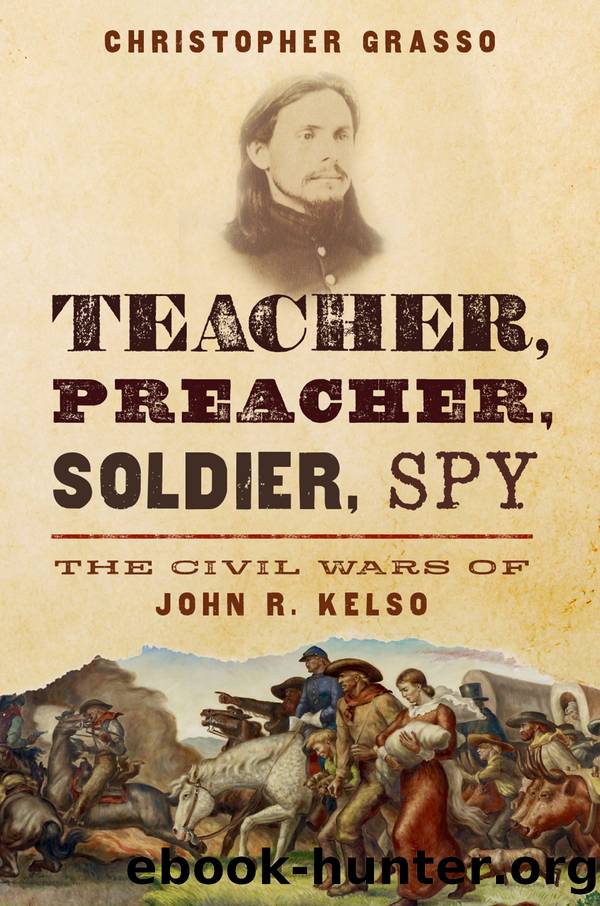Teacher, Preacher, Soldier, Spy by Christopher Grasso

Author:Christopher Grasso
Language: eng
Format: epub
Publisher: Oxford University Press
Published: 2021-01-15T00:00:00+00:00
13
The Great Mistake
kelso had long intuited that he was destined for greatness. He would make a mark in the world, and not just through his exploits in the war. Facing death on the battlefield, the Hero of the South West had been emboldened by deep âimpressionsâ he could not explain, convictions that he would survive the moment and go on to accomplish grand things after the guns had gone quiet. His election to Congress had seemed to be the next step for this âchild of destiny.â But then he made a choiceâa single decision during his congressional careerâand the course of his life, he reflected later, seemed to swerve. A âgreat mistake,â he called it, a mistake that began a new era where he seemed to stumble at every major decision, âa period of my life, continuing several years, that was so crowded with mistakes, misfortunes and sorrows that I would fain blot every vestige of the memory of it from my mind if I could.â He had made a political decisionâone of many, and he had made it, he thought, like all of them, from âgood motivesâ and using his âbest judgment.â Only later did he see it as a major fork in his lifeâs road.1
Kelso had made plenty of political decisions during the first session of the 39th Congress, and the things he had said and doneâhis votes, resolutions, speeches, and circularâwere before the Fourth Districtâs voters as they began to choose candidates for the fall 1866 election. Missouriâs Conservative Unionist party had rallied around Andrew Johnson, forming âJohnson Clubsâ in the state, including one in Springfield. The Conservatives cheered when the president opposed the 14th Amendment. When they read the June 25 call for a National Union Convention of Johnsonâs Democratic and conservative Republican supporters, they planned to send delegates. Missouriâs Radical (Republican) Unionists, meanwhile, worked to strengthen their local organizations and state party apparatus, the Executive Committee urging the formation of âRadical Union Clubs.â They held local mass meetings, like those in Greene and Dallas counties in March, which condemned Johnson and supported Congress. In the Fourth Congressional District, Conservatives knew that their only chance would be to have more than one Radical running in the general election and split the vote. Radicals knew that too, and party organizers were determined to come out of the district convention in late July unified behind one candidate. Whatever damage Kelso had done with his circular, he was still in the running.2
The leading Radical candidates were Kelso, Boyd, and Col. Joseph J. Gravely. A former state senator, Gravely was described was a âself-made manâ who, like Kelso, had begun the war as a private and had then risen up through the ranks. He had commanded posts at Lebanon and Springfield and fought in the field against Shelby and Price. He was a lawyer and a good stump speaker, and he had solid Radical credentials. County caucuses, choosing delegates for the district convention, showed support for all three candidates.3
When Governor
Download
This site does not store any files on its server. We only index and link to content provided by other sites. Please contact the content providers to delete copyright contents if any and email us, we'll remove relevant links or contents immediately.
Wondrous Transformations by Alison Li(768)
Madame Figaro by 27 Janvier 2023(650)
William Tryon and the Course of Empire by Paul David Nelson(452)
If Wishes Were Coffee by Moore Michelle(428)
Tabloid Love by Bridget Harrison(422)
Against All Odds by Alex Kershaw(398)
Growing Up Underground by Steven Heller(394)
Jacob H. Schiff by Naomi W. Cohen(376)
Nephew by M.K. Asante(360)
Against All Odds: A True Story of Ultimate Courage and Survival in World War II by Kershaw Alex(357)
Bronx by Jerome Charyn(341)
The Missionary of Wall Street: From Managing Money to Saving Souls on the Streets of New York by Stephen F. Auth(337)
From Loyalists to Loyal Citizens by Valerie H. McKito(334)
Crossing Highbridge by Waters Maureen;(333)
Working on the Dock of the Bay by Michael D. Thompson(332)
Beware of Limbo Dancers by Reed Roy;(329)
Growing Up with Clemente by Peterson Richard;(321)
Pioneer Mother by Hillary Brown(315)
Studying Wisconsin by Martha Bergland & Paul G. Hayes(307)
